Community Profile: Paragould Finds Formula To Attract Manufacturers
Photo Gallery | Article
Photo Gallery - Paragould, Ark.
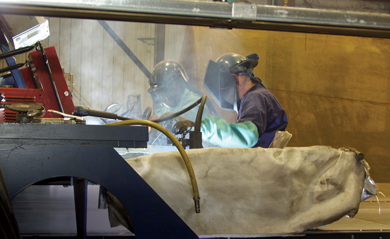
Workers at the American Railcar Industries plant in Paragould, Ark. Photo © American Railcar Industries
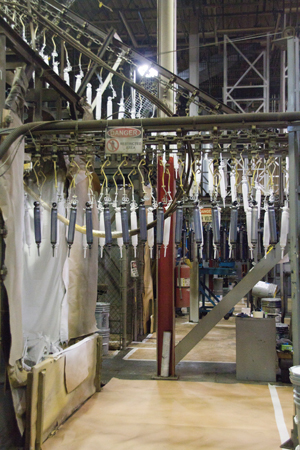
At Tenneco, shock absorbers enter a water-based electrostatic paint booth. The plant opened as Monroe Automotive Equipment in 1970 and was bought by Tenneco in 1977. Tenneco has since expanded it. Photo by Susan C. Thomson
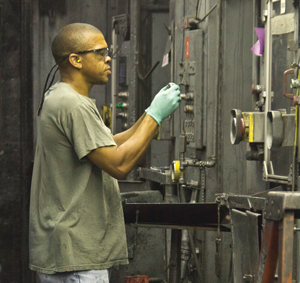
John B. McKay Jr., a Tenneco employee, performs a quality inspection on a product component made from powdered metal by a compacting press. Photo by Susan C. Thomson
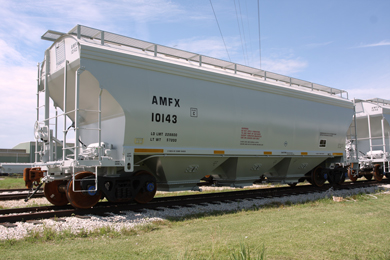
One of the railcars made by American Railcar Industries in Paragould. Photo © American Railcar Industries
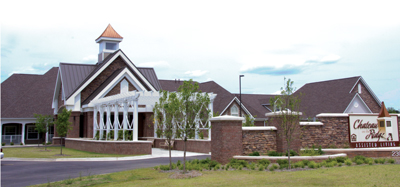
Chateau on the Ridge, a 59-unit assisted living center, opened late last year. It was built at a cost of more than $11 million by the hospital in town, Arkansas Methodist Medical Center. The hospital’s operations are growing as more industry is attracted to town; conversely, more medical services help to attract more industry, says the hospital’s CEO. Photo by Susan C. Thomson
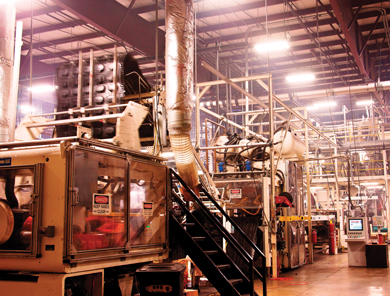
Anchor Packaging is the fourth-largest employer in town. At left is an in-line thermoforming machine at its Paragould plant. Photo © Anchorpac
Bill Fisher follows kilowatt-hours. It goes with his job as chief executive of Paragould Light Water and Cable, a city-owned utility in Paragould, Ark. He observes, for instance, that industries bought 51 percent of all of the electricity his company sold in 2011, up from 48 percent in 2009. That's "a larger percentage of electrical usage by manufacturing than you normally would see in a community this size," 35 percent or so being more typical, he says. From the numbers, it's obvious to him that this is a community with an unusually strong and growing manufacturing base.
That base, established a decade and a half ago, has been building since early 2011, when the city's four largest industrial employers set off on simultaneous hiring sprees, thanks to upturns in orders for their various products. Kelly Wright, chairman of the Greene County Economic Development Corp., calculates that together they have created upward of 1,500 jobs since then. American Railcar Industries Inc. (ARI) alone took on 600 new hires last year to meet a sudden, steep surge in demand for the cars it makes in Paragould and in the smaller Greene County community of Marmaduke. Company officials project they'll increase employment by another 200 before 2012 is out.
ARI was wooed to Paragould in the mid-1990s, an unusually fruitful period in economic development that also brought Anchor Packaging Co., Utility Trailer Manufacturing Co. and Sunlite Casual Furniture to town.
Paragould Mayor Mike Gaskill says Sunlite never came close to the 1,200 jobs it promised and had only 200 employees when it lapsed into bankruptcy liquidation in 2002, five years after arriving. The city has not lost a major employer in his 15-year tenure, he says.
The other three newcomers stayed and, from small beginnings, thrived through occasional layoffs. With prosperous, homegrown Tenneco—a maker of shock absorbers and other "ride-control" products for the automotive aftermarket—they make up the city's big four industries today.
While conceding that the city may have benefited from "a little bit of luck" in the jobs-creation area, Gaskill insists that most of the credit can be traced to hard work. The strategy, he says, has been to deliberately and tirelessly pursue any employer, including those looking to relocate, that offers the city "better-paying ... secure jobs"; in return, the city offers the employers reasonably priced sites with utility hookups and infrastructure improvements.
State financial incentives for job creation are also said to have proved persuasive in attracting and retaining these companies. Jack Pipkin, ARI's vice president of global railcar manufacturing, says the company has been further won over by "the best workforce we have ever encountered."
In this northeastern corner of the state, farms still far outnumber factories. Besides wheat, soybeans, cotton and rice, their products include, in Pipkin's view, people who are accustomed to and eager for hard work.
"They're (also) mechanically inclined," the result of growing up on those farms, adds Tenneco's plant manager, Richard Hartness.
That's a plus, given these companies' continuing needs for shop-floor labor, skilled and unskilled. These are nonunion jobs. They pay, though, from about $12.50 to as much as $15 or $16 an hour, says Sue McGowan, economic development director and chief executive of the Paragould Regional Chamber of Commerce. "Most offer health benefits, dental benefits and eye care" and "a lot of incentives for performance, attendance and safety," she adds.
Recognizing the need for their employees' continuing education, the city's big industries were instrumental in a community effort that led to the 1998 founding of the Greene County Industrial Training Consortium. Under the umbrella of the Paragould campus of Black River Technical College, the consortium provides custom short courses in subjects like welding, management, computers and manufacturing, tailored to the needs of local businesses, big or small, manufacturing or other.
Hand in hand with the jobs boom, Paragould has seen a substantial increase in population—up 18.6 percent in the 2010 U.S. census. That was after an 18.5 percent gain in the 2000 census.
To keep up, the city has expanded services and amenities, most obviously with a community center, which features two racquetball courts, two regulation basketball courts, a walking track, a competition-sized indoor pool with retractable roof and an outdoor water park. The city built it and a nearby fire station and improved parks with the proceeds of $13.5 million in bonds, retired over 10 years thanks to a dedicated, temporary ½-cent sales tax. City voters approved it by about 2-to-1 in 2001, along with a permanent ½-cent sales tax to employ 10 more police officers and three more firefighters and to maintain the parks and new facilities.
The community center opened in 2004, followed the next year by a Holiday Inn Express next door. Commercial development has continued to grow with, for example, a Lowe's and a Chili's restaurant, both new to town in the past five years.
Arkansas Methodist Medical Center, meanwhile, "has continued to grow and grow," bringing "a lot of good doctors, a lot of specialists" to Paragould, says Bobby Kasserman, community president of Liberty Bank.
The 129-bed hospital completed a new office building, atrium and emergency room in 2000. Late last year, it made a big splash when it opened Chateau on the Ridge, a 59-unit assisted living facility that cost $11.2 million. Over the coming 10 years, hospital chief executive Barry Davis envisions expanding this into a community offering a full range of retirement-living options, including a nursing home. Sooner, perhaps within two years, he imagines the hospital itself breaking ground on an addition, which will include a new out-patient entrance, expanded dietary and imaging services, plus space for the hospital to complete its conversion to all private rooms. Details, including financing, remain to be worked out.
Davis describes the relationship between industry and the hospital as mutually beneficial: The hospital gains from the creation of jobs providing health insurance and becomes, in turn, "a very important tool for recruitment of industry."
The recruitment continues with as great a sense of urgency as ever. "The only way we can keep from dying is we've got to create and maintain jobs," says Wright.
To that end, city voters in June 2011 approved by a ratio of about 2-to-1 a ¼-cent sales tax for economic development. The proceeds are estimated to amount to about $1 million a year, beginning this year. The city's Industrial Development Corp., which manages the funds, expects to use the bulk of them to buy property suitable for industrial development. One 40-acre parcel has already been purchased and is for sale, along with a 6-year-old 100,000-square-foot spec building.
Kasserman is optimistic. "I think that industry is always going to be looking for a place to locate that's got a good workforce, and we've got that," he says. But will there
be enough of it?
Satya Garg, who manages the plant where Anchor Packaging makes plastic containers and film for food packaging, isn't so sure. He's concerned that the company's growth may be "outpacing the availability" of workers.
For Utility Trailer as well, "it's getting more and more difficult to hire employees," says David Neighbors, who manages the plant. It's running at its peak employment to date, coping with what he describes as "a torrent of orders." The rush has followed a period during the recent recession when sales "fell off a cliff"; the plant responded by reducing employment by more than half. Its products—53-foot-long, rear-wheeled semitrailers that attach to truck cabs—are "hugely cyclical," Neighbors says.
Railcars are cyclical, too. Kasserman sees additional risk in ARI, Utility Trailer and Tenneco all being transportation-related. In the future, he says, he "would like to see a little more diversification" in Paragould's industrial lineup .
Paragould/Greene County, Ark., by the numbers
| POPULATION FOR CITY/COUNTY |
26,113/42,720 (1)
|
| LABOR FORCE |
NA / 19,081(2)
|
| UNEMPLOYMENT RATE |
NA / 9.1 percent (2)
|
| PER CAPITA PERSONAL INCOME |
NA / $25,166 (3)
|
| (1) U.S. Census Bureau, 2010 for city, 2011 for county. | |
| (2) BLS/Haver Analytics, April 2012, seasonally adjusted. | |
| (3) BEA/Haver Analytics, 2010. | |
| Largest Employers | |
| American Railcar Industries |
1,520(2)
|
| Tenneco |
1,350(3)
|
| Arkansas Methodist Medical Center |
790(3)
|
| Anchor Packaging |
675(2,3)
|
| Utility Trailer Manufacturing |
600
|
| (1) Self-reported (2) Includes plant in Marmaduke (3) Includes part-time employees |
|
Views expressed in Regional Economist are not necessarily those of the St. Louis Fed or Federal Reserve System.
For the latest insights from our economists and other St. Louis Fed experts, visit On the Economy and subscribe.
Email Us



